Stories about...Research Experiences for Teachers (RET)
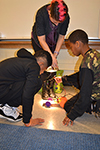 Becerra and Muskin Expose Wiley Fifth Graders to Engineering Via Fun Solar Projects
Becerra and Muskin Expose Wiley Fifth Graders to Engineering Via Fun Solar Projects
March 7, 2019
On most Tuesday mornings since the end of January, Tanissa Tutwiler's 5th grade class at Wiley Elementary has been learning some things about mechanical, electrical, even environmental engineering via some cool hands-on projects, including making a solar cell and designing a solar car. The activities were presented by a couple of Illinois staff who are passionate about STEM education: Natalie Becerra, who currently works as Extra Help for the Graduate Office in Academic Affairs, but who dreams of doing STEM outreach permanently, and Joe Muskin, the Education Coordinator of the Mechanical Science and Engineering Department.
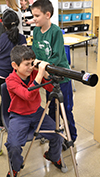 STEAM Studio AstroTech Unit Focuses on Telescopes Courtesy of Astronomy’s Wong
STEAM Studio AstroTech Unit Focuses on Telescopes Courtesy of Astronomy’s Wong
Feburary 22, 2019
When folks at STEAM Studio, Next Generation School's after-school program that emphasizes STEAM (Science, Technology, Engineering, and Math [STEM], plus Art) were planning a curriculum on Astro-Technology, they recalled that the father of one of their students was an astronomer. So it made perfect sense for Illinois Astronomy Professor, Tony Wong, to come and present to Kristi Hiatt’s Tera class (3rd–5th graders). During his visit, Wong didn’t get to share much about his research in molecular clouds, star formation, or the evolution of galaxies, but he did get to zero in on a tool he uses on a pretty regular basis: the telescope. And not only did the students learn about different kinds of telescopes and what they’re good for, they actually got to put together some Galileo telescopes and look through them to see what they could see.
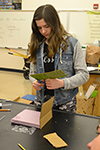 Monticello Teacher Exposes Students to the Engineering Process Via a POETS-RET-Developed Curriculum
Monticello Teacher Exposes Students to the Engineering Process Via a POETS-RET-Developed Curriculum
Feburary 20, 2019
For the last month or so, eighth graders in Jennifer Smith’s class at Monticello Middle School have been learning a whole lot about what being an engineer might be like. They’ve been designing infant incubators as part of a month-long curriculum Smith helped design when she participated in the POETS’ Research Experience for Teachers (RET). While doing so, they’ve not just learned some science and about the engineering process; they’ve experienced what working on a team is like.
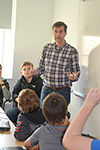 Cornerstone Christian Homeschoolers’ Students Design Infant Incubators Using POETS RET-Developed Curriculum
Cornerstone Christian Homeschoolers’ Students Design Infant Incubators Using POETS RET-Developed Curriculum
January 24, 2019
Over the last several months, 7th through 12th grade students who are a part of a home school support group, Cornerstone Christian Homeschoolers, have not only been learning some things about engineering and heat, but they have been discovering that engineers work to solve real-world problems. Using a POETS RET-developed curriculum, Joe Muskin, Education Coordinator for the NSF-funded POETS (Power Optimization for Electro-Thermal Systems) Engineering Research Center, has been working with the students who, after learning some of the science and engineering they might need to draw on, have been designing infant incubators for the developing world.
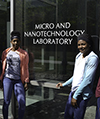 MNTL Day Exposes UHS Students to Nanotechnology Research During I-STEM’s Summer Multidisciplinary Camp
MNTL Day Exposes UHS Students to Nanotechnology Research During I-STEM’s Summer Multidisciplinary Camp
September 29, 2017
On Tuesday, August 8, MNTL Day, the 27 Urbana High School (UHS) student athletes who participated in I-STEM’s pilot summer camp: A Multidisciplinary STEM Program, visited MNTL (the Micro and Nanotechnology Lab), for “A Primer on Semiconductors.” Students had the opportunity to hear from each of the eleven P–20 STEM teachers who participated in the nano@illinois Research Experience for Teachers (RET), funded by the National Science Foundation where they did cutting-edge research in nanotechnology under some of Illinois’ premier researchers in the field. In the afternoon, Dr. Mark McCollum led students on a tour of MNTL’s cleanroom laboratory.
 nano@Illinois RET Teachers Experience Cutting-Edge Nanotechnology Research—Introduce It to Their Students
nano@Illinois RET Teachers Experience Cutting-Edge Nanotechnology Research—Introduce It to Their Students
September 18, 2017
In its fourth and final year, the nano@illinois Research Experience for Teachers (RET), funded by the National Science Foundation, offered eleven P–20 STEM teachers the opportunity to do cutting-edge research in the field of nanotechnology under some of Illinois’ premier researchers in the field. The second emphasis of the RET was for teachers to develop modules related to their research that could be used in their own and other classrooms. The goal of the RET is that, based on teachers’ resulting enthusiasm, content knowledge, and increased familiarity with possible careers in the field, along with the modules they develop, which will be available for use by other teachers as well, a larger number of students will be exposed to the field.
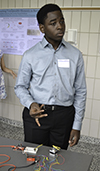 POETS’ Education Program Introduces Students of All Ages to Interdisciplinary Research in Electro-Thermal Systems
POETS’ Education Program Introduces Students of All Ages to Interdisciplinary Research in Electro-Thermal Systems
August 31, 2017
In addition to cutting-edge research in electro-thermal systems, the NSF-funded POETS (Power Optimization for Electro-Thermal Systems) Engineering Research Center has educational programs that expose students (as well as the teachers) to POETS’ research via educational activities, research, and courses that foster interdisciplinary collaboration and expose learners to the unique research that takes place in the Center.
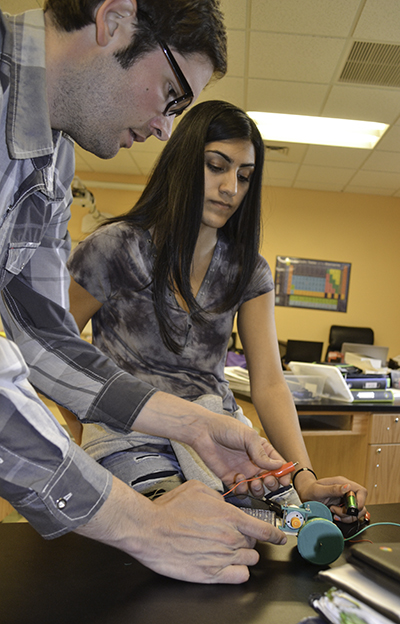 Local 8th Graders Build Solar Cars Courtesy of POETS' RET
Local 8th Graders Build Solar Cars Courtesy of POETS' RET
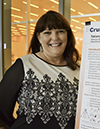 nano@illinois RET's Tatiana Stine Hopes to Help Expose Youngsters to Nanotechnology
nano@illinois RET's Tatiana Stine Hopes to Help Expose Youngsters to Nanotechnology
September 5, 2016
An instructional coach at a local school, Tatiana Stine is passionate about helping her teachers implement the Next Generation Science Standards—especially engineering. A participant in the nano@illinois RET program this past summer, she got to work with innovative nanotechnology while conducting research on graphene. And she not only learned a lot of new things, she developed teaching modules she plans to take back to her teachers. And one day, while waiting for gold nanoparticles to deposit on her device, she came up with a fun and novel way to teach youngsters about nanotechology—Gene the Graphene.
FULL STORY
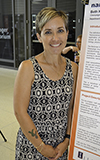 nano@illinois RET Teachers Discover Nanotechnology's Big Impact—Hope Their Students Will Too
nano@illinois RET Teachers Discover Nanotechnology's Big Impact—Hope Their Students Will Too
August 31, 2016
If you get them hooked early, the kids will think graphene is so cool, and that spark could make them the next big nano scientist.” – Tatiana Stine
This summer 11 teachers of varying grade levels and backgrounds participated in the nano@illinois Research Experience for Teachers (RET) funded by the National Science Foundation. While participating in research in a wide range of areas, these teachers’ eyes were opened to the intricate world of nanotechnology and all the possibilities it offers. But while the research is important, that’s not the program's only goal. It is expected that these teachers will then take all that they learned through their research on nanotechnology and, with support from staff and other teachers, translate it into lesson modules they can use with their students back home. It is hoped that as they are able to successfully teach their students what they’ve learned, they’ll not only be exposing them to STEM, but some of its cutting-edge possibilities, like nanotechnology, that their students may never been exposed to before because of a variety of factors, including their socioeconomic background.
FULL STORY
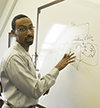 POETS Seeks to Change the Attitudes, Shape of Students in the STEM Pipeline
POETS Seeks to Change the Attitudes, Shape of Students in the STEM Pipeline
March 18, 2016
Andrew Alleyne, PI of the NSF-funded Center for Power Optimization of Electro-Thermal System (POETS), says the Center’s educational components are “all hypothetical at this point” and just “plans in people’s heads.” However, his plans and those of POETS’ Co-Directors of Education, Fouad Abd-el-Khalick (K-12 students) and Phil Klein (undergraduate/ graduate students), and Education Coordinator Joe Muskin appear to be well thought out and seek to strategically strengthen the education of targeted populations along the STEM pipeline.
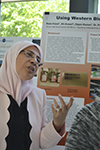 RET Teachers Experience Multidisciplinary Nanotechnology Research via nano@illinois
RET Teachers Experience Multidisciplinary Nanotechnology Research via nano@illinois
August 3, 2015
When the twelve P-20 STEM teachers participating in this summer’s iteration of nano@illinois Research Experience for Teachers (RET) arrived on campus to do research in some of Illinois’ state-of-the-art labs under some of Illinois’ premier researchers, they learned a whole lot about their research topics. And while learning about converting 3D files to DNA brick objects, or receptor differences in cancer cells, or graphene, or that micro cavities can trap light between mirrors, they discovered one overarching fact about nanotechnology research at Illinois: it isn’t all housed in one particular department. While nanotechnology is about things that are really, really small, nanotechnology research on campus is really big and is spread out across numerous disciplines.
FULL STORY
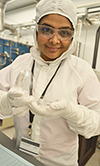 2015 nano@illinois RET Teachers Perform Nanotechnology Research, Make Modules
2015 nano@illinois RET Teachers Perform Nanotechnology Research, Make Modules
August 3, 2015
Funded by the National Science Foundation, the nano@illinois Research Experience for Teachers (RET) offered eleven practicing P-20 STEM teachers and one pre-service teacher the chance to do research under some of Illinois’ premier researchers in their state-of-the-art labs. Over the next year, teachers are then to develop a module related to their nanotechnology research that can be used in their own or other classrooms. According to Program Coordinator Carrie Kouadio, the RET's main goal is “that the students will be impacted and can benefit from the teacher's increased enthusiasm, higher content knowledge, and ability to direct them in considering careers.”
FULL STORY
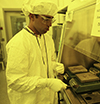 MNTL and its Role in Shaping our Future
MNTL and its Role in Shaping our Future
July 18, 2016
The Micro and Nanotechnology Laboratory (MNTL) at the University of Illinois at Urbana-Champaign, one of the largest and most advanced facilities of its kind in the country, home to 16 cleanrooms, 46 general purpose labs, as well as a biosafety level-2 complex, is playing a significant role in solving real world problems and helping bridge the gap between the developing and developed world.
 Local Biology Teacher to Introduce her Students to Research on Quantum Dots
Local Biology Teacher to Introduce her Students to Research on Quantum Dots
July 10, 2014
“I teach in a very small school with limited resources," says science teacher Aubrey Wachtel, "so one of the best things that I can do is have experiences and then bring them back to the classroom." So this summer, Wachtel is experiencing nanotechnlogy while researching quantum dots."
FULL STORY
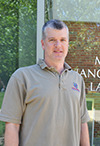 Local Science Teachers Experience Research in NanoTechnology
Local Science Teachers Experience Research in NanoTechnology
July 9, 2014
For the next three years, a number of area science teachers will have an opportunity to participate in the Nano@illinois RET, where they will not only learn about, but actually participate in, cutting edge research in nanotechnology and even adapt some of what they have learned for students in their classrooms.
FULL STORY













.jpg)
















